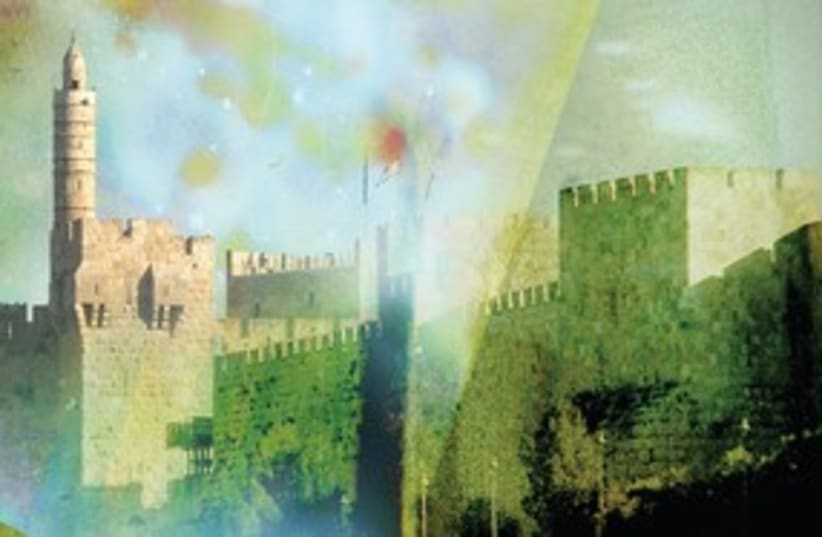The program was held in conjunction with the Jewish National Fund. This was one of the earliest sessions of the famous Machon program which still functions today. The group was due to have left Jerusalem in March 1948 but was unable to leave the city due to the siege and was forced to remain in the city for Pessah and until the first cease-fire in June. Berman found herself witness to historical events of unprecedented drama and importance. She kept a diary in which she wrote every day, wrote long and detailed letters home, took photographs and saved mementos of the events around her. In the diary, she describes Seder night in Jerusalem in 1948 and how Haganah soldiers thwarted her efforts to make the place kosher for Pessah. She yelled at them, and the next day they left to fight in the battle for Sheikh Jarrah...Everything was still. In the light of the full moon the spreading leaves of the trees remained almost rigid casting shadows all around. It was Pessah 1948. Slowly I wandered homewards towards Beth Hakerem, the garden suburb of Jerusalem with the words of Had Gadya still ringing in my ears. Some hours ago I had sung with all my heart “Next Year in Jerusalem Built Anew.”I was happy to be in Eretz Yisrael for the privilege of adding these words, “Built Anew.” The road was deserted and as I walked alone the wolves howled to each other in the background. I wondered why they seemed louder than usual. I was keenly aware of my footsteps crouching the gravel under my feet. The atmosphere was hot and clammy, yet, the spasmodic rat-tat-tat of the machine guns echoing and re-echoing over the hills sent a shiver down my back. An eerie symphony.Aviva, my roommate and I had exhausted ourselves trying to clear away all traces of hametz from our room. We had shifted beds, wardrobes and dressing tables, and in our bare feet thoroughly scrubbed the stone floor using part of our ration of drinking water for the purpose. All our blankets and bedding had hung for hours on the sunny balcony and every corner had been scoured. I remember feeling proud of a job well done.
Their last supper: A traumatic Pessah in Jerusalem, 1948
All I wanted to know was why they had brought in hametz. Did they not care that it was already Pessah?

The program was held in conjunction with the Jewish National Fund. This was one of the earliest sessions of the famous Machon program which still functions today. The group was due to have left Jerusalem in March 1948 but was unable to leave the city due to the siege and was forced to remain in the city for Pessah and until the first cease-fire in June. Berman found herself witness to historical events of unprecedented drama and importance. She kept a diary in which she wrote every day, wrote long and detailed letters home, took photographs and saved mementos of the events around her. In the diary, she describes Seder night in Jerusalem in 1948 and how Haganah soldiers thwarted her efforts to make the place kosher for Pessah. She yelled at them, and the next day they left to fight in the battle for Sheikh Jarrah...Everything was still. In the light of the full moon the spreading leaves of the trees remained almost rigid casting shadows all around. It was Pessah 1948. Slowly I wandered homewards towards Beth Hakerem, the garden suburb of Jerusalem with the words of Had Gadya still ringing in my ears. Some hours ago I had sung with all my heart “Next Year in Jerusalem Built Anew.”I was happy to be in Eretz Yisrael for the privilege of adding these words, “Built Anew.” The road was deserted and as I walked alone the wolves howled to each other in the background. I wondered why they seemed louder than usual. I was keenly aware of my footsteps crouching the gravel under my feet. The atmosphere was hot and clammy, yet, the spasmodic rat-tat-tat of the machine guns echoing and re-echoing over the hills sent a shiver down my back. An eerie symphony.Aviva, my roommate and I had exhausted ourselves trying to clear away all traces of hametz from our room. We had shifted beds, wardrobes and dressing tables, and in our bare feet thoroughly scrubbed the stone floor using part of our ration of drinking water for the purpose. All our blankets and bedding had hung for hours on the sunny balcony and every corner had been scoured. I remember feeling proud of a job well done.